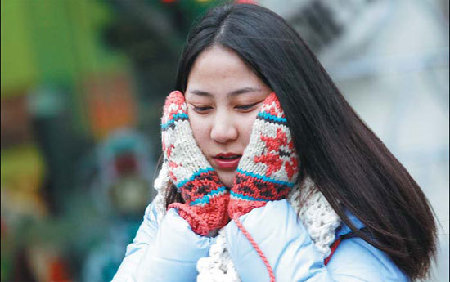
Traditional Chinese medicine experts suggest the most important rule of keeping fit in winter is not to exert yourself, either physically or mentally. Photos provided to China Daily
"Chinese people for many generations have eaten more green vegetables and fruits. Their stomachs and spleens tend to be a tad weak and afraid of the cold."
The doctor also advises people to sleep early and wake up late during winter.
"Staying up late hurts the kidneys," Wang says. His suggestion is to sleep from 9 pm to 8 am, until the sun rises, if possible.
On the other hand, eat food that enhances yang energy and beats the cold, such as lamb, and use ginger while cooking. "But don't over do it, or you can get excessive heat," Wang says.
The Chinese tradition is to eat turnips in winter, which can help to clear up the excessive heat.
The doctor suggests moderate physical exercise in winter. One should shed just a little sweat, but not too much. Otherwise it hurts the yang.
Tai chi, jogging and walking are good. Hot spring is good, but not sauna, Wang says.
Finally, he says people should also conserve energy spiritually.
"Recollect your thoughts, do sitting meditation, rest more, and cut down on very exciting entertainment," he suggests.
In such harsh winter, those with heart and lung problems should take particularly good care of themselves. That's because the coldness will contract the blood vessels. For people with such conditions, they should take particular care to keep warm.
Those with asthma and respiratory problems should pay attention to keeping the chest, back and feet warm.
TCM doctors have some traditional herbs to beat the cold.
An ancient recipe is to drink white liquor with ginseng and huangqi, or astragalus herb. But it is not good for people with excessive heat or abundant energy.
The liquor should be consumed in the morning. In the evening, people need to eat qiju dihuangwan, a herbal medicine, to dispel possible excessive heat.
One of such warming and moistening food is babaozhou, eight-treasure congee. The congee contains a number of ingredients: The dried longan, jujube and millet have warming properties, while rice, yellow beans, mung beans and rock sugar are moistening.
Xu Wenbo, general manager and doctor with Beijing Dongwen Clinic, says some people might not feel cold, but only because their senses have become blunt.
"Some patients we've seen recently have had foot problems and weak kidneys, which lead them to get up to urinate often at night. But they still wear only one pair of trousers, and say they don't feel cold," she says.
Xu says the clinic has specially prepared a winter warming kit, including yang replenishing moxibustion sticks, a warming herbal recipe and a massage medical bag to help with painful joints.
"There is a Chinese idiom that goes: Not conserving energy in winter is certain to lead to illness in the coming spring. So, beware," she warns.
Contact the writer at yejun@chinadaily.com.cn.
